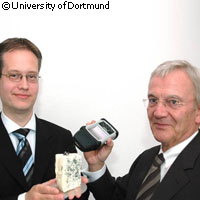Spanish cheeses to benefit from modern logistics technologies
German researchers are helping cheese makers from the northern Spanish region of Asturias apply the latest in logistics to their small scale operations. The project is funded by the EU through the INTERREG IIIC programme and the German region of North Rhine-Westphalia. Queso Calabres is a blue, Asturian cheese which is made from a mixture of cows' and goats' milk and ripened in mountain caves. It is only made by family-owned businesses that produce the cheese in relatively small amounts. Nevertheless, these farmers, like all businesses in the food and feed industry, are obliged to comply with EU legislation which requires them to track and trace their product throughout the production process. To help them do this, the Dortmund scientists, together with a state food laboratory in Spain, have turned to RFID (radio frequency identification) technology. 'The goal of the project is to develop a reliable labelling for each individual cheese which is applied at the first stage of production (filling the raw milk into the mould), survives the ripening process and finally follows the cheese on the wrapping into food shops,' said Professor Rolf Jansen, Head of the Department of Logistics at the University of Dortmund. During the first stage of production, a transponder is applied to the cheese; the challenge for Jansen and his team was to develop a transponder which was small enough to allow the cheese to breathe during the ripening process. They also had to ensure that no external fibres or flavourings get into the cheese during the process. During packaging, the transponder is removed and replaced by a serial number which allows the cheese to be traced back to source from the counter at the supermarket. Finally, the customer will also be able to find out more about the cheese they have just bought. By entering a number found on the packaging into a website, the consumer will be able to find out which farm supplied the milk that went into the cheese, when the cheese was made and how long it spent in the ripening caves. Several thousand cheeses will be fitted with RFID tags, which can only be written on or read by a data station or handheld device. The EU laws are designed to avoid a repeat of food scares concerning, for example, rotting meat. Thanks to RFID technology, in case of a recall of a certain product, specific batches of food can be quickly identified and removed from supermarket shelves.
Countries
Germany, Spain



